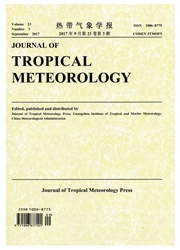

 中文摘要:
中文摘要:
Paprika pepper, as one of the main vegetable crops, is originated in the tropics and now widely planted in the world for its dietary therapy and medicinal functions. For its typical physiological properties referring to low tolerances to flood, drought and cold, paprika pepper often suffers from one or several disasters during its growing period,especially under tropical climate. Paprika pepper in Hainan, as a typical region of tropical climate in China, sustains flood, chilling and drought disaster risks induced by varied weather systems. This study was to develop and employ appropriate indices to assess hazard, sensitivity, vulnerability and prevention capability for major disasters during paprika pepper growth period, using long-term meteorological data from 1998 to 2011, actual disasters record from 1999 to 2011, production and socioeconomic statistics from 2002 to 2011 at 18 weather stations. Based on the Analytic Hierarchy Process and Entropy method, the combined weight was given to each disaster factor, thus an integrated disaster risk assessment model was developed and applied at regional level. High flood hazard mainly occurred in eastern Hainan, high chilling hazard in north and central mountain areas, and high drought hazard in the western part of Hainan. Drought and chilling sensitivity had a similar spatial distribution which decreased from central to coastal regions while flood sensitivity was the opposite. High vulnerability of the disasters mainly occurred in central regions,similar to low prevention capability. Eastern Hainan suffered from high integrated damage risk. The predicted damage occurrence showed a good agreement with the occurrence of actual disasters. We concluded that an integrated damage risk assessment model could provide a new tool to assess major meteorological disasters and help farmers and policy makers to alleviate the risks of major meteorological disasters for paprika pepper, which seems also suitable for other crops.
 英文摘要:
英文摘要:
Paprika pepper, as one of the main vegetable crops, is originated in the tropics and now widely planted in the world for its dietary therapy and medicinal functions. For its typical physiological properties referring to low tolerances to flood, drought and cold, paprika pepper often suffers from one or several disasters during its growing period,especially under tropical climate. Paprika pepper in Hainan, as a typical region of tropical climate in China, sustains flood, chilling and drought disaster risks induced by varied weather systems. This study was to develop and employ appropriate indices to assess hazard, sensitivity, vulnerability and prevention capability for major disasters during paprika pepper growth period, using long-term meteorological data from 1998 to 2011, actual disasters record from 1999 to 2011, production and socioeconomic statistics from 2002 to 2011 at 18 weather stations. Based on the Analytic Hierarchy Process and Entropy method, the combined weight was given to each disaster factor, thus an integrated disaster risk assessment model was developed and applied at regional level. High flood hazard mainly occurred in eastern Hainan, high chilling hazard in north and central mountain areas, and high drought hazard in the western part of Hainan. Drought and chilling sensitivity had a similar spatial distribution which decreased from central to coastal regions while flood sensitivity was the opposite. High vulnerability of the disasters mainly occurred in central regions,similar to low prevention capability. Eastern Hainan suffered from high integrated damage risk. The predicted damage occurrence showed a good agreement with the occurrence of actual disasters. We concluded that an integrated damage risk assessment model could provide a new tool to assess major meteorological disasters and help farmers and policy makers to alleviate the risks of major meteorological disasters for paprika pepper, which seems also suitable for other crops.
 同期刊论文项目
同期刊论文项目
 同项目期刊论文
同项目期刊论文
 期刊信息
期刊信息
